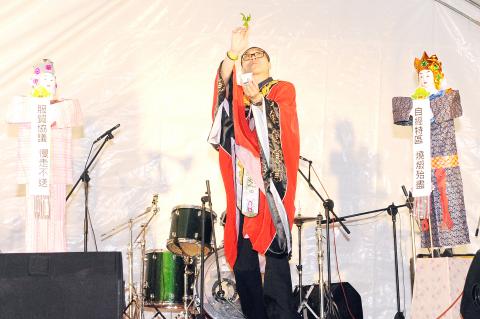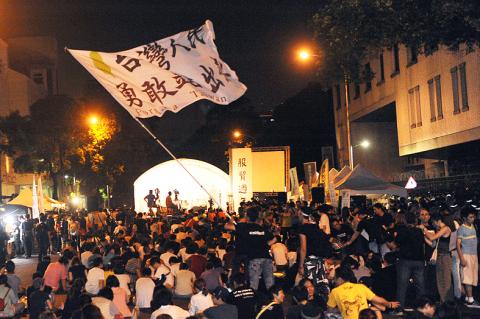Hundreds of people marked the first anniversary of the signing of the cross-strait service trade agreement with a protest outside the Legislative Yuan in Taipei last night.
Decorating the stage with ornaments traditionally used for funeral events, such as white banners, pairs of paper dolls, mini pagodas and canned drinks, the protesters, mobilized by the Black Island Youth Front and the Taiwan March and Democracy Tautin, started the rally with a student dressed in a Taoist priest’s outfit performing an exorcism.
“May the cross-strait service trade agreement have a safe passage to the underworld,” he said. “May the free economic pilot zones perish. President Ma Ying-jeou’s [馬英九] government, go ahead and cross the bridge.”

Photo: Chen Chih-chu, Taipei Times
The crowd, many who also took part in the 23-day occupation of the legislative floor in March, shouted chants that are usually cited during funerals.
The call for the government to cross the bridge comes from the folk belief that there is a bridge connecting the world of the living and the world of the dead. Since the spirits of the newly dead are confused, not knowing where to go, the Taoist priest and the family of the deceased must shout to direct him or her to cross the bridge to the underworld.
“The purpose of the ritual is to send away all the ‘dirty things,’ and the dirtiest thing in this country is the government under Ma’s leadership,” said Dennis Wei (魏揚), a Sunflower movement student leader. “If the government hasn’t learned its lesson by attempting to pass the cross-strait service trade agreement and it still want to pass the pilot zones plan by force, we will not hesitate to fight it.”

Photo: Chen Chih-chu, Taipei Times
One of the reasons the groups organized the rally is because Ma, who doubles as chairman of the Chinese Nationalist Party (KMT), had earlier asked the KMT caucus to put all its efforts into passing the cross-strait service trade agreement and the bills on pilot zones during an extra legislative session which started last week and is scheduled to last three weeks, Wei said.
Taiwan Association of University Professors chairman Lu Chung-chin (呂忠津) expressed his concern about the negative impact that the two economic plans might have on the nation.
“The so-called pilot zones are actually a backdoor for privileged commercial groups and through these groups China can apply its political influence bit by bit,” Lu said. “Instead of taking up its responsibilities to boost the declining economy, the Ma administration has unilaterally decided to play the game of patronage, bringing in Chinese forces and helping them take over Taiwan through economic means.”
Between speeches, several independent musicians and bands performed to show their support for the protesters.
To prevent the occupation of the legislature from happening again, police surrounded the legislature with barbed-wire barricades more than a week ago. In the afternoon, police reinforced the barricades by fixing them to the ground, connecting them together and blocking most of the gates that lead to legislative compound.
A police source said that in addition to the regular force stationed at the Legislative Yuan, as many as 360 more officers were deployed.

People can preregister to receive their NT$10,000 (US$325) cash distributed from the central government on Nov. 5 after President William Lai (賴清德) yesterday signed the Special Budget for Strengthening Economic, Social and National Security Resilience, the Executive Yuan told a news conference last night. The special budget, passed by the Legislative Yuan on Friday last week with a cash handout budget of NT$236 billion, was officially submitted to the Executive Yuan and the Presidential Office yesterday afternoon. People can register through the official Web site at https://10000.gov.tw to have the funds deposited into their bank accounts, withdraw the funds at automated teller

PEACE AND STABILITY: Maintaining the cross-strait ‘status quo’ has long been the government’s position, the Ministry of Foreign Affairs said Taiwan is committed to maintaining the cross-strait “status quo” and seeks no escalation of tensions, the Ministry of Foreign Affairs (MOFA) said yesterday, rebutting a Time magazine opinion piece that described President William Lai (賴清德) as a “reckless leader.” The article, titled “The US Must Beware of Taiwan’s Reckless Leader,” was written by Lyle Goldstein, director of the Asia Program at the Washington-based Defense Priorities think tank. Goldstein wrote that Taiwan is “the world’s most dangerous flashpoint” amid ongoing conflicts in the Middle East and Russia’s invasion of Ukraine. He said that the situation in the Taiwan Strait has become less stable

CONCESSION: A Shin Kong official said that the firm was ‘willing to contribute’ to the nation, as the move would enable Nvidia Crop to build its headquarters in Taiwan Shin Kong Life Insurance Co (新光人壽) yesterday said it would relinquish land-use rights, or known as surface rights, for two plots in Taipei’s Beitou District (北投), paving the way for Nvidia Corp to expand its office footprint in Taiwan. The insurer said it made the decision “in the interest of the nation’s greater good” and would not seek compensation from taxpayers for potential future losses, calling the move a gesture to resolve a months-long impasse among the insurer, the Taipei City Government and the US chip giant. “The decision was made on the condition that the Taipei City Government reimburses the related

FRESH LOOK: A committee would gather expert and public input on the themes and visual motifs that would appear on the notes, the central bank governor said The central bank has launched a comprehensive redesign of New Taiwan dollar banknotes to enhance anti-counterfeiting measures, improve accessibility and align the bills with global sustainability standards, Governor Yang Chin-long (楊金龍) told a meeting of the legislature’s Finance Committee yesterday. The overhaul would affect all five denominations — NT$100, NT$200, NT$500, NT$1,000 and NT$2,000 notes — but not coins, Yang said. It would be the first major update to the banknotes in 24 years, as the current series, introduced in 2001, has remained in circulation amid rapid advances in printing technology and security standards. “Updating the notes is essential to safeguard the integrity